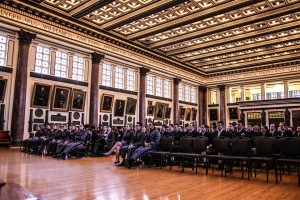
Delegates convene in Opening Ceremonies
This past weekend, some of the best teams on the collegiate circuit convened atop the Hudson River to compete at the West Point Model United Nations Invitational Conference (WPMUNI). While small and hosted every two years, WPMUNI is a one-of-a kind experience that provides delegates with a rewarding seven-way joint crisis, an intimate atmosphere between all 14 teams, and a furthered relationship between civilians and the military.
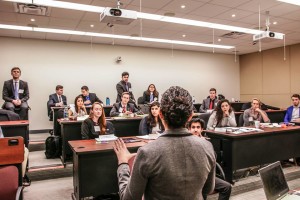
The Secretary of State testifies before the Senate
WPMUNI commenced with Opening Ceremonies in the beautiful Cullum Hall, with all 97 delegates and 45 cadet staffers convening to start off their weekend. Secretary General Sneha Singh introduced their keynote speaker, COL Liam Collins, a Special Forces Officer. The conference showcased seven premier committees: the Senate Committee on Foreign Relations, the House of Representatives Foreign Affairs Committee, the Joint-Special Operations Command, the United States Central Command, the North Atlantic Treaty Organization, the Cabinet of the Turkish Presidency, and the Ad Hoc committee: the U.S. National Security Council. This seven-way crisis challenged delegates to understand how public policy and presidential advisement affect military action, and experience the breeches of communication that exist between them.
At WPMUNI, I noticed a few key aspects that differentiated this conference from the rest of its peers. The first was the overall objective of challenging delegates to understand the interconnectedness of public policy, executive advisement, and defense in national foreign policy. The second characteristic was realism in crisis arcs, the expectation of delegates to have practical crisis webs in their roles as civil servants. The final aspect is WPMUNI’s success in bridging a gap between bridge of civil-military divide between future military and civilian leaders.
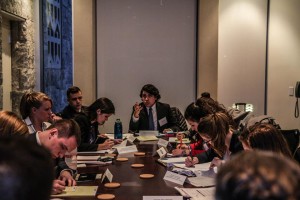
The President’s National Security Council
The Committees
When WPMUNI secretariat and staff first convened to begin planning their 2016
conference, they set an overall objective of furthering delegate understanding of how foreign policies affect on military action. They compiled seven committees that incorporated fields of public policy, executive advisement, defense capabilities, and foreign policy threats, to fruition. The seven-way crisis at WPMUNI was a feat that many of its peers have had trouble succeeding in, and West Point accomplished this with a small-sized staff. Secretary General Singh stated this was a key objective for the weekend:
“Our main goal was to expose students to the impact of congressional decisions on the lives of military professionals. In addition to that, there are some nuances and unilateral powers associated with the different command centers of the US military that also affect legislative decisions.”
In committee, delegates in the NSC were expected to advise the President on national security threats, while managing extensive military strategies compiled by JSOC and CENTCOM committees, appeasing their Congressmen in the Senate CFR and House FAC, all while addressing foreign policy threats in the Middle East between Turkey and a newly established Kurdish state.
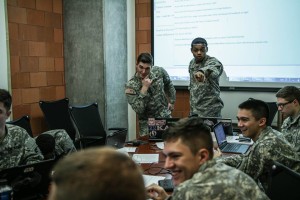
The Crisis Room
Realistic Crisis
When delegates arrived to their committees, their Crisis Director, Ezra Engel, was quick to remind them of his expectations of their actions through crisis. While many crisis committees experience their delegates acquiring nuclear weapons, building a multi-million business empire, poisoning their peers, and commanding an army of orphans, WPMUNI set a precedent of keeping true to your role as a public officer and expanding your powers through practical policy moves. This goal was met by months of staff preparation. Engel, who set accuracy as a standard in crises, stated:
“They were all shown a real Islamic State propaganda video on Thursday night. While the crisis itself was fiction, there is nothing fictional about the threats that we addressed. We feel that it’s important to communicate to you not only the nature of the conflicts that we may become involved in, but to personalize that conflict….. It was more important to us that each committee (and delegates in that committee) got a good hard look at what the U.S. military does and is capability of.”
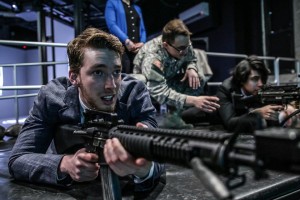
Delegates try shooting simulators
A Greater Purpose
WPMUNI was not just comprised of inter-committee fun, but also delegate exposure to life at West Point On Friday, delegates were treated to an extensive tour of the barracks, training facilities, and participate in a shooting range simulator. Delegates were led across the grounds with West Point Cadets and learned about the Academy’s extensive history and role in American defense. In the U.S. National Security Council Committee, ad hoc delegates were treated to a private talk with COL Nielsen, Deputy Department Head for the Department of Social Sciences and a former military intelligence officer and advisor to General Petraeus. During the evening, delegates were treated to a reception, kicked back with their peers at Pub Crawl, and socialized in Cullum Hall with cadets at the Formal Gala, a highlight of many over the weekend. All of these experiences had an objective: furthering an appreciation between civilians and the military. Bagdadi explained,
“WPMUNI set out to bridge a little bit of the civil-military divide between future military and civilian leaders, and to give our college counterparts a larger understanding of how the U.S military works and operates on a daily basis — all while having a fantastic time. I think that objective was solidly met.”
When I asked Bagdadi what makes WPMUNI stand out from the rest, he stated, “What separates WPMUNI is that its goal is to accurately simulate an organism that a significant part of the MUN circuit actually strives to be a part of one day, inside an institution that plays a key strategic role in feeding that organism, and with the people who will be implementing the policies of that organism on the ground.”
Congratulations to the winning delegations!
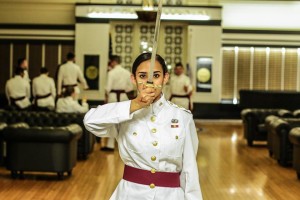
The Secretary General leads the procession
Outstanding Delegation: Florida State University
Best Delegation: Georgetown University
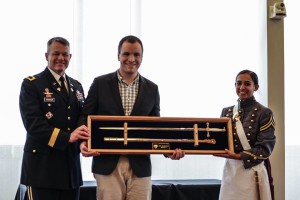
Georgetown University wins Best Delegation
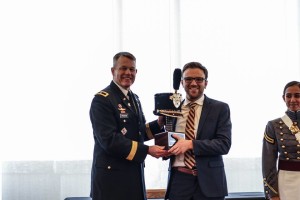
Florida State wins Outstanding Delegation

